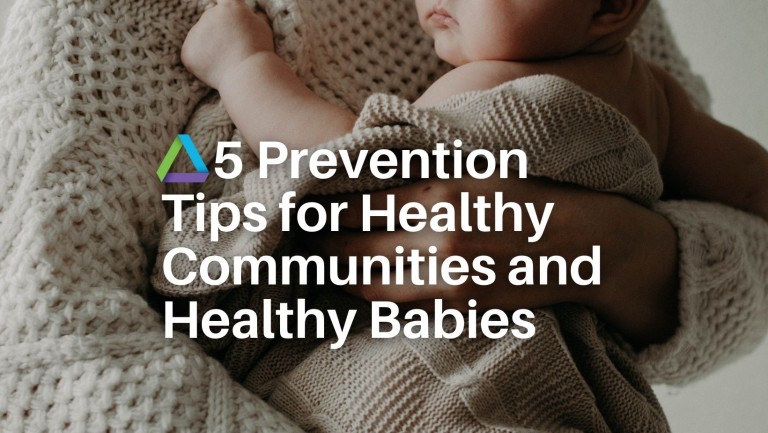For healthier communities and healthier babies, we are sharing resources for National Birth Defects Awareness Month! Many birth defects can be prevented by following these healthy lifestyle tips before & during your pregnancy.
Not all birth defects can be prevented. But you can increase your chances of having a healthy baby by doing what you can to be your healthiest self both before and during pregnancy.
Tip ❶: Be sure to take 400 micrograms (mcg) of folic acid every day.
Folic acid is very important because when taken before and during early pregnancy, it can help prevent some major birth defects of the baby’s brain and spine. Our bodies use this B vitamin to make new cells. Folate is found naturally in certain fruits, vegetables, and nuts. Folic acid, the synthetic or man-made form of folate, is found in fortified foods (called "enriched foods"), such as breads, pastas, and cereals. Balancing all these foods to get the right amount of folic acid in your daily diet can be hard. The easiest way to get the right amount of folic acid is to supplement your diet with a multivitamin that has 400 mcg of folic acid every day.
Tip ❷: Book a visit with your healthcare provider.
Thinking about pregnancy? Be sure to talk to your healthcare provider about these topics at your next visit!
- All medications you are currently taking, including vitamins and/or herbal and homeopathic supplements. Many individuals need to take medicine to stay healthy, and there are often benefits to continuing your treatment throughout your pregnancy. If you are trying to have a baby or are just thinking about it, now is a great time to start getting ready for pregnancy by talking with your doctor about medications you may be taking. This can give you time to consider all options that can help keep you and your developing baby as healthy as possible.
- Family medical history: Along with your existing medications and treatments, it is important to consider the health conditions on both sides of the family. Based on your family history, your doctor might alter your care or refer you for genetic or nutritional counseling.
- Regular prenatal care: Those who are already pregnant or think that they could be pregnant should see their healthcare providers as soon as possible. The earlier and more consistently you see your healthcare provider, the more opportunities there are to monitor your development and address any questions that might arise along the way. So be sure to keep all prenatal care appointments.
- Mental Health: Individuals with children or those that are expecting deserve the best - including the very best mental health. Depression during and after pregnancy is common and treatable. If you think you have depression, seek treatment from your health care provider as soon as possible. Depression causes enormous suffering and disability and reduces your response to your child’s needs. Evidence indicates that treating the depression of individuals expecting a baby leads to improved growth and development of the newborn and reduces the likelihood of diarrhea and malnutrition among them.
- Accessibility to resources including WIC (Women, Infants, and Children), food stamps, Medicaid, etc. If you and your family need additional support, ask your doctor about how these and other resources may help.
Tip ❸: Become up-to-date with vaccines.
If you are pregnant or planning a pregnancy, the specific vaccines you need are determined by your age, lifestyle, medical conditions, travel, and previous vaccinations. Talk with your healthcare provider about getting up to date on all your vaccines. CDC recommends that pregnant women get two vaccines during every pregnancy: the inactivated flu vaccine (the injection, not the live nasal spray flu vaccine) and the Tdap vaccine. Vaccines help protect you and your baby. Having the right vaccinations at the right time can help keep you and your baby healthy.
Flu: Getting a flu shot is the first and most important step in protecting against flu. The flu shot given during pregnancy has been shown to protect both mom and baby (for up to 6 months after delivery) and reduces associated flu symptoms like a fever – which may be associated with neural tube defects and other adverse outcomes for a developing baby.
Tdap: You should get the Tdap vaccine near the end of each pregnancy (weeks 27 – 36). After getting the shot, your body will make protective antibodies that will pass to your baby before birth and provide some short-term protection against whooping cough. Anyone helping to take care of a new baby should also receive the Tdap vaccine before the baby is born. Vaccination of pregnant women with Tdap is especially important to help protect babies.
Pregnant people are more likely to get severely ill with COVID-19 compared with non-pregnant people. If you are pregnant, you can receive a COVID-19 vaccine. Getting a COVID-19 vaccine during pregnancy can protect you from severe illness from COVID-19. If you have questions about getting vaccinated, a conversation with your healthcare provider might help, but is not required for vaccination.
Getting vaccinated is easy and vaccines are available at the doctor’s office and many pharmacies and most are covered by insurance. Did you know that most health insurance plans cover recommended vaccines for both children and adults at little or no cost to you? And even if you don’t have health insurance, you can still get vaccinated and you may be able to do it for free or at low cost. Federally funded health centers provide preventive services and wellness care, including vaccines — and may offer sliding fees based on your income. Find a health center near you. Your state health department can also tell you where to go for free and low-cost vaccines, including community centers, schools, and religious centers.
Tip ❹: Care for your body and mind before and during pregnancy to set you and your baby up for success.
Honoring and listening to your body by choosing nourishing foods that you enjoy, moving your body in ways that give you energy, and managing your stress are great habits to build at any stage in your life. Continuing these habits throughout pregnancy will require some adjustments at various stages, but whatever your body size or shape, work with your healthcare provider to plan for a healthy pregnancy.
Although Body Mass Index (BMI) is not a perfect measure of healthy weight, we do know that a higher BMI at the start of a pregnancy is associated with a higher risk for certain health problems, including serious birth defects. Talk to your healthcare provider to set an action plan for a healthy pregnancy.
Managing your stress can help you achieve and maintain a healthy body. Stress may increase your risk of gestational diabetes and preterm labor. It can also lead to high blood pressure during pregnancy and preeclampsia. Additionally, stress can make it very difficult to make healthy
decisions, like avoiding harmful substances. Talk to your provider about ways to manage your stress and reach out to people you trust to ask for help.
Not everyone has access to healthy foods and safe places for physical activity. Get involved in your community to make sure your friends and neighbors are well supported and have options to make healthy choices during pregnancy.
Tip ❺: Boost your health by avoiding harmful substances during pregnancy, such as alcohol, tobacco, and other drugs.
What is healthy for you is healthy for your baby. Substance use (alcohol, drugs, cigarettes, marijuana, etc.) and/or substance misuse (taking medications differently than prescribed) can be harmful to a pregnancy and infants who are breastfeeding.* The best way to keep yourself, your pregnancy, and your baby healthy is to avoid substance use and to take prescription and over the counter medications only as directed while trying to get pregnant, throughout pregnancy, and while breastfeeding. If you are already pregnant, it is not too late to get help. The earlier you can stop or cut back, the better.
It is important to discuss all medication and substance use with your healthcare providers. Sometimes it can feel too hard to stop using or misusing substances. At other times, abruptly stopping substances might cause withdrawal symptoms. You do not need to go through this process alone. There are health professionals who can provide medical help, guidance and support. One such resource is The Substance Abuse and Mental Health Services Administration (SAMHSA). They run a free and confidential National Helpline, that is available around the clock (in English and Spanish) for individuals and families facing mental and/or substance use disorders. You can also visit their website for information and resources.

